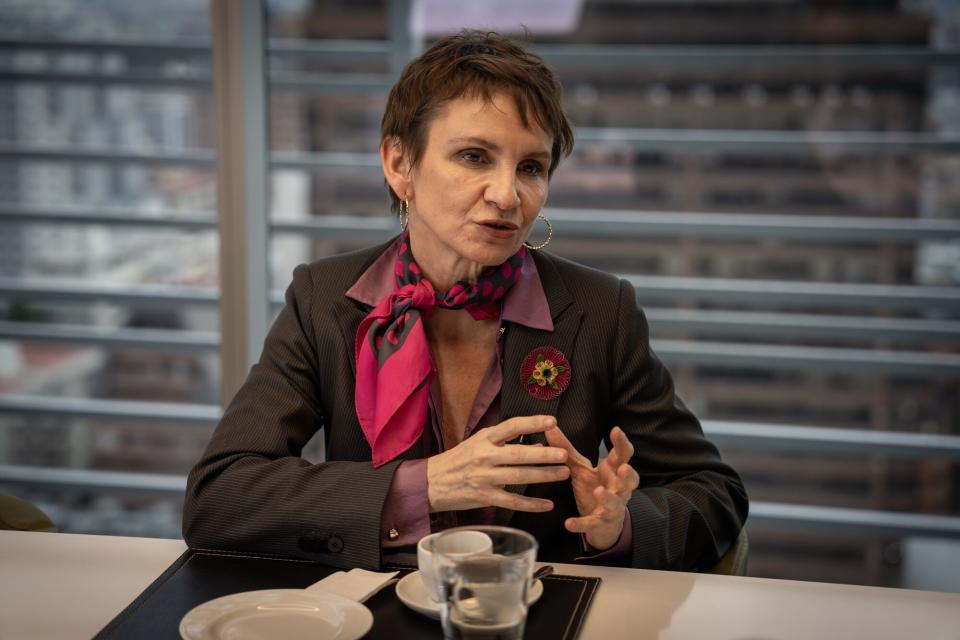Chile Says Venezuela Is Coming Up Short in Regional Crime Fight

(Bloomberg) -- Chile’s government will pressure Venezuela to step up in the fight against crime as Latin America stares down the threat from international gangs, a senior cabinet member said in an interview.
Most Read from Bloomberg
Wells Fargo Fires Over a Dozen for ‘Simulation of Keyboard Activity’
Apple to ‘Pay’ OpenAI for ChatGPT Through Distribution, Not Cash
Hunter Biden Was Convicted. His Dad’s Reaction Was Remarkable.
US Producer Prices Surprise With Biggest Decline Since October
Tech Powers Stocks as Adobe Surges in Late Trading: Markets Wrap
Collaboration with nations including Ecuador, Peru and Bolivia has produced results, Carolina Toha said at Bloomberg’s office in Santiago. Chile needs Venezuela to provide information on citizens who are suspected of crimes locally, and also for help in catching suspects who have fled abroad, she said.
“There are strategies with the entire region, and with some countries it’s been easier than others,” said Toha. “It’s been complex with Venezuela.”
Toha, who is the nation’s interior minister and is serving as acting president this week while head of state Gabriel Boric is on an official trip abroad, spoke as the government prepared for heavy rains in the nation’s center and south.
Toha leads the government’s crime-fighting strategy and is one of Chile’s most influential and experienced ministers. Her responsibilities rank among the most challenging in local politics. Gangs affiliated with the criminal organization Tren de Aragua, which originated in Venezuela, are sparking fear among voters that violence is spinning out of control, weighing heavily on the administration’s support.
“Tren de Aragua has hit Latin America as a whole,” she said. “Venezuela has a theory that they dismantled the gang’s hierarchy. But, the truth is that we have seen how organized crime is extremely dynamic.”
A former lower house deputy and government spokeswoman under Michelle Bachelet, Toha said Chile will keep channels open and seek solutions with Venezuela’s government. Chile will also present its viewpoint to international bodies.
“Venezuela has certain international obligations to us and at a multilateral level that it must fulfill,” Toha said.
Venezuela’s government didn’t immediately respond to request for comment.
Tren de Aragua’s growth is closely tied to the exodus of more than 7 million Venezuelans over the past decade. Countries including Colombia, Peru, Ecuador and Chile have raised concerns about kidnappings, drug trafficking and murders they attribute to the group.
Last week, the government sent a note of protest to Nicolas Maduro’s administration after Public Prosecutor Tarek William Saab alleged Chilean intelligence officials were involved with the kidnapping and murder of Venezuelan political refugee Ronald Ojeda earlier this year. Chile has said Venezuela is unwilling to help with the investigation of the killing.
Better Numbers
Boric’s administration got some good news in April, when government data showed homicides fell 6% in 2023 after having surged the year prior. The numbers for 2024 so far show further improvement following the end of the Southern Hemisphere summer in March, Toha said.
“The numbers are better than last year, but it’s still early,” Toha said. “We have to maintain this inflection through time in order to be able to say that we broke the upward trend.”
Central to the government’s strategy is a set of anticrime bills that were placed on a fast track in May, granting them legislative priority in coming months. It includes proposals to create a Public Security Ministry, protect critical infrastructure and strengthen municipalities’ violence-fighting abilities.
Toha said it’s become increasingly difficult to reach consensus due to higher political tensions in the legislature. “Today, the environment in Congress is very complex,” she said. “It’s tough to advance the debates.”
Complicating matters further, polls show that the public’s perceptions of violence haven’t improved. Chile’s biggest business associations, including Sofofa, have also maintained pressure on the government to curb crime, pointing to a negative impact on company activities.
Toha said there’s a greater frequency of violent crimes in Chile than before, and that trend is fueling the public’s negative perceptions.
She attributed that shift to factors including growing strength in organized crime starting in the Covid-19 pandemic, the weakening of Chilean institutions immediately following social unrest in 2019 and efforts by some gangs to take advantage of waves of regional migration.
“For the public, it’s been a huge shock to see violent crimes committed in Chile that before we only knew of in the movies,” Toha said. “And now, we see them happening in the streets.”
--With assistance from Andreina Itriago Acosta.
Most Read from Bloomberg Businessweek
Israeli Scientists Are Shunned by Universities Over the Gaza War
Grieving Families Blame Panera’s Charged Lemonade for Leaving a Deadly Legacy
The World’s Most Online Male Gymnast Prepares for the Paris Olympics
China’s Economic Powerhouse Is Feeling the Brunt of Its Slowdown
©2024 Bloomberg L.P.

 Yahoo Finance
Yahoo Finance 